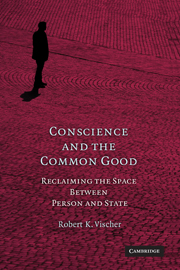8 - Schools
Published online by Cambridge University Press: 05 June 2012
Summary
The overly individualized conception of conscience is unmistakable in education. On the provider side, teachers have long claimed academic freedom on a variety of grounds, but the conscience-driven dimension of such claims recently received a high-profile media jolt in Cupertino, California, where an elementary school teacher sued the school district for religious discrimination after his curricular choices were subjected to screening for inappropriate religious content by the principal. His case, although ultimately unsuccessful legally, garnered widespread sympathy as a welcome effort to infuse a secularized educational orthodoxy with a teacher's own religious sensibility.
On the consumer side, the conscience of a student dissenting from prevailing social norms has been a pressing jurisprudential concern since the Supreme Court in West Virginia Bd. of Ed. v. Barnette recognized a student's right not to pledge allegiance to the majority's sacred ideals. The latest evidence of the dissenting conscience's prominence comes from Dover, Pennsylvania, where a federal court invalidated the local school board's clumsy effort to introduce Intelligent Design to the high school science curriculum. The implicit religious underpinnings of the board policy, coupled with compulsory attendance laws, sensitized the court to the plight of the captive student conscience.
Deference to the individual consciences of both educational provider and consumer make sense under our traditional “common school” framework. Where students and their families are presented with a single option of publicly financed schooling, and where public school teachers' employment opportunities are fungible in terms of the moral content of the curriculum and pedagogical mission, the school is functionally equivalent to the state.
- Type
- Chapter
- Information
- Conscience and the Common GoodReclaiming the Space Between Person and State, pp. 206 - 238Publisher: Cambridge University PressPrint publication year: 2009



